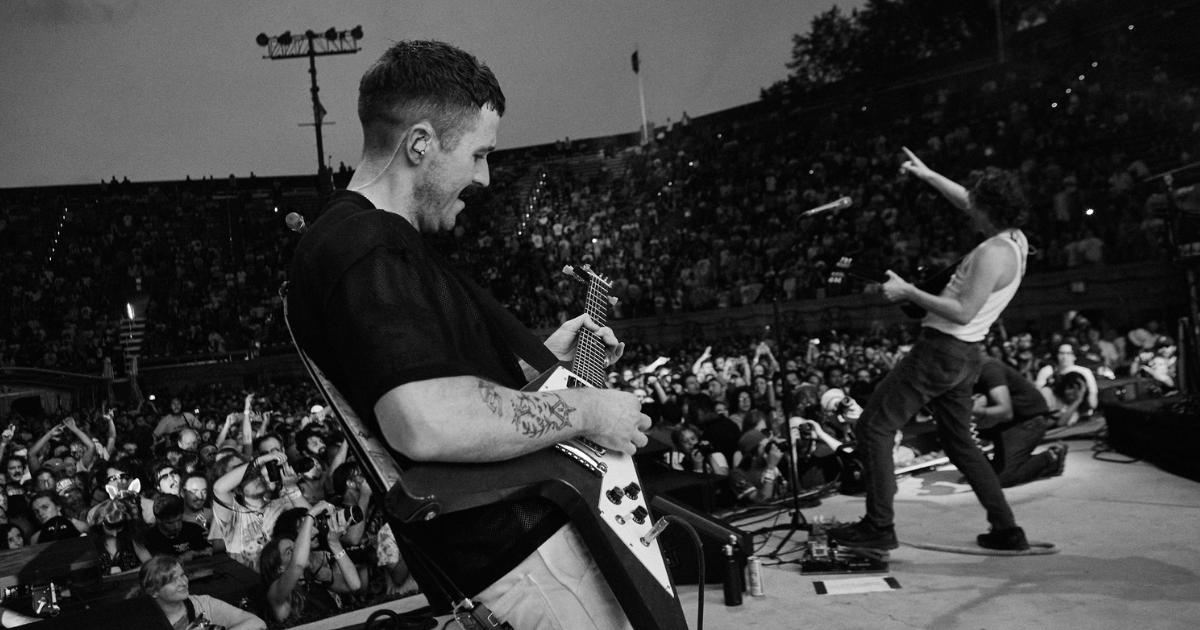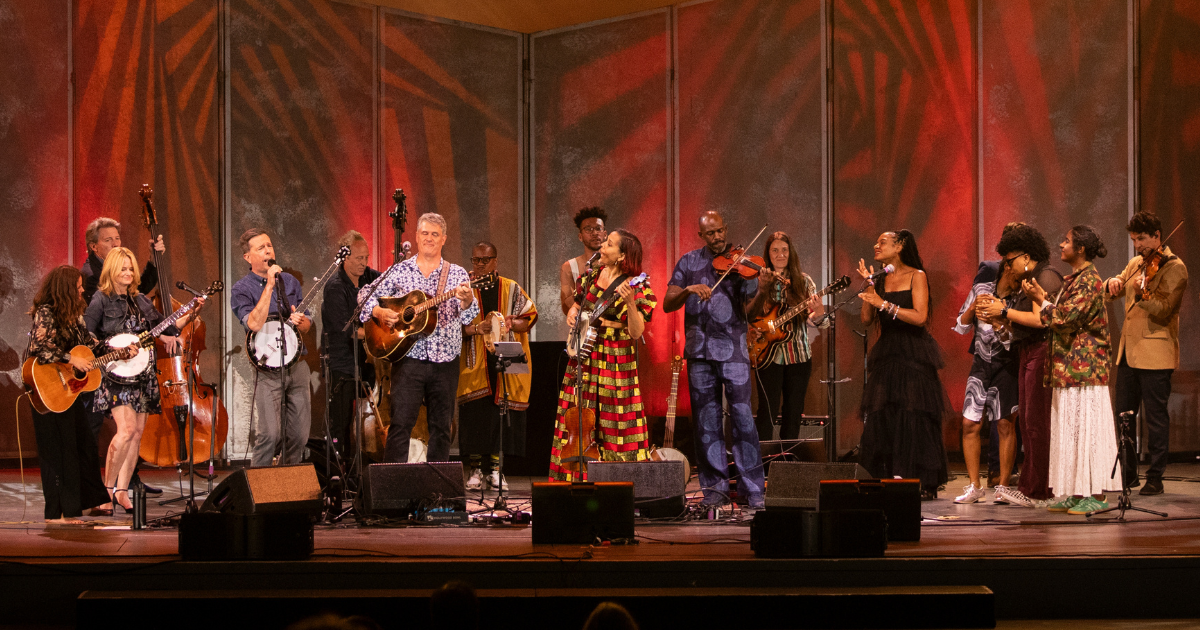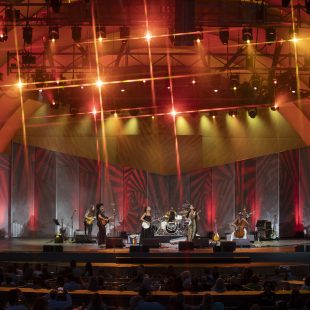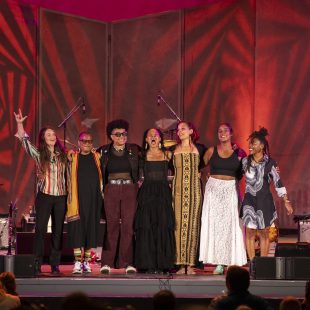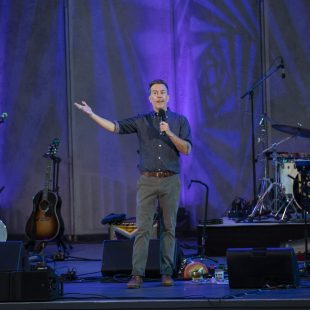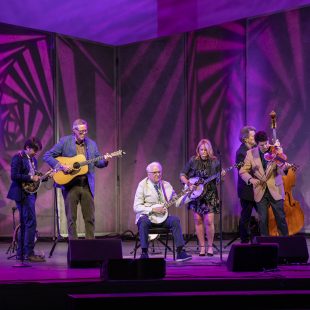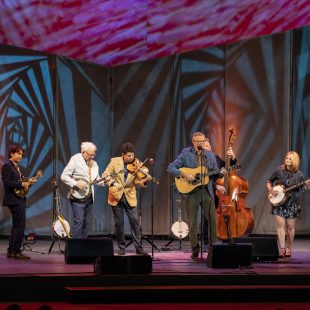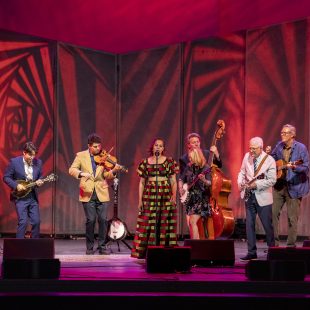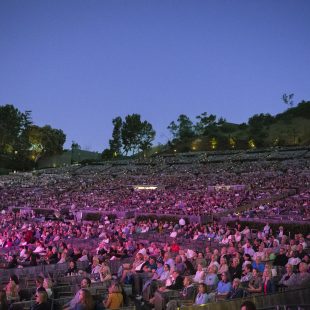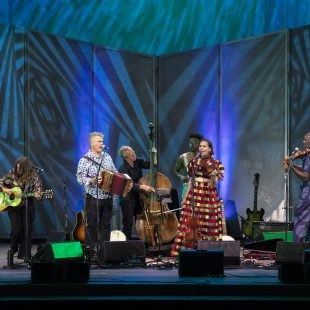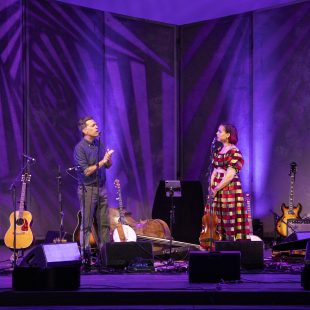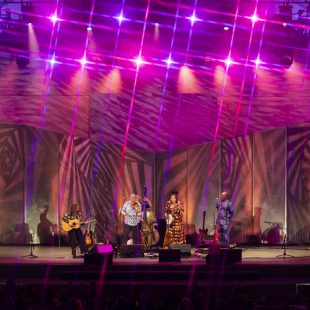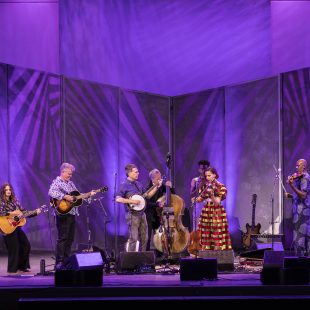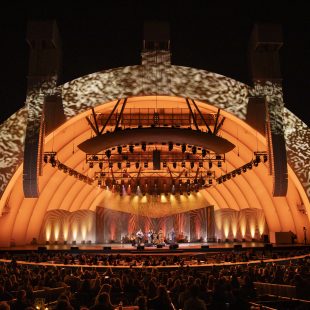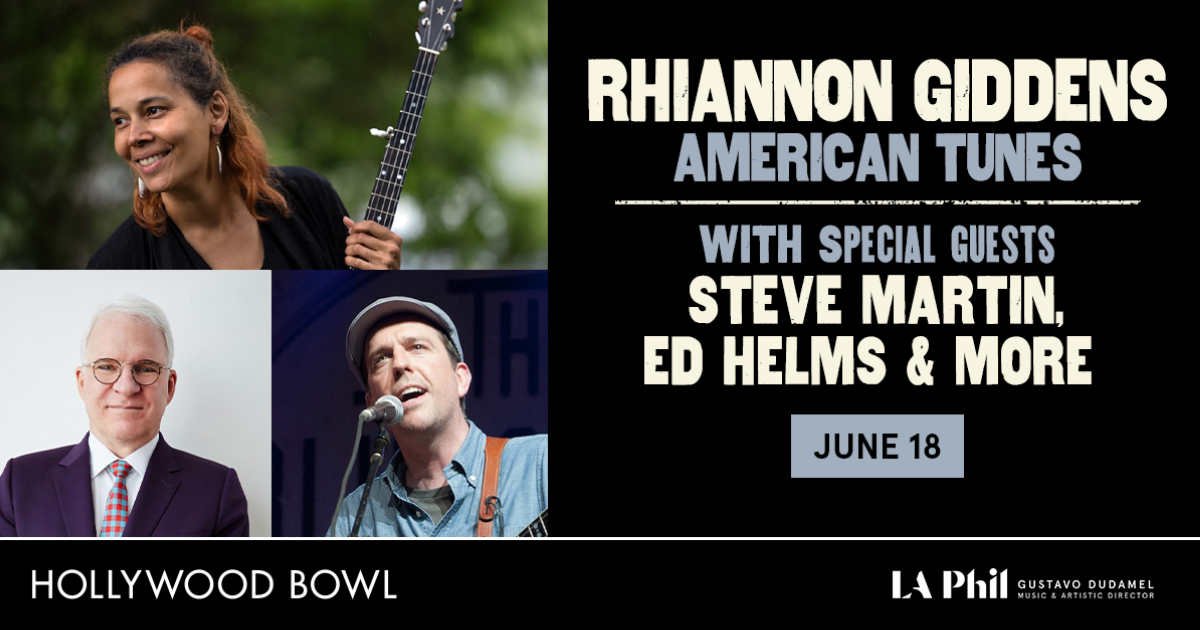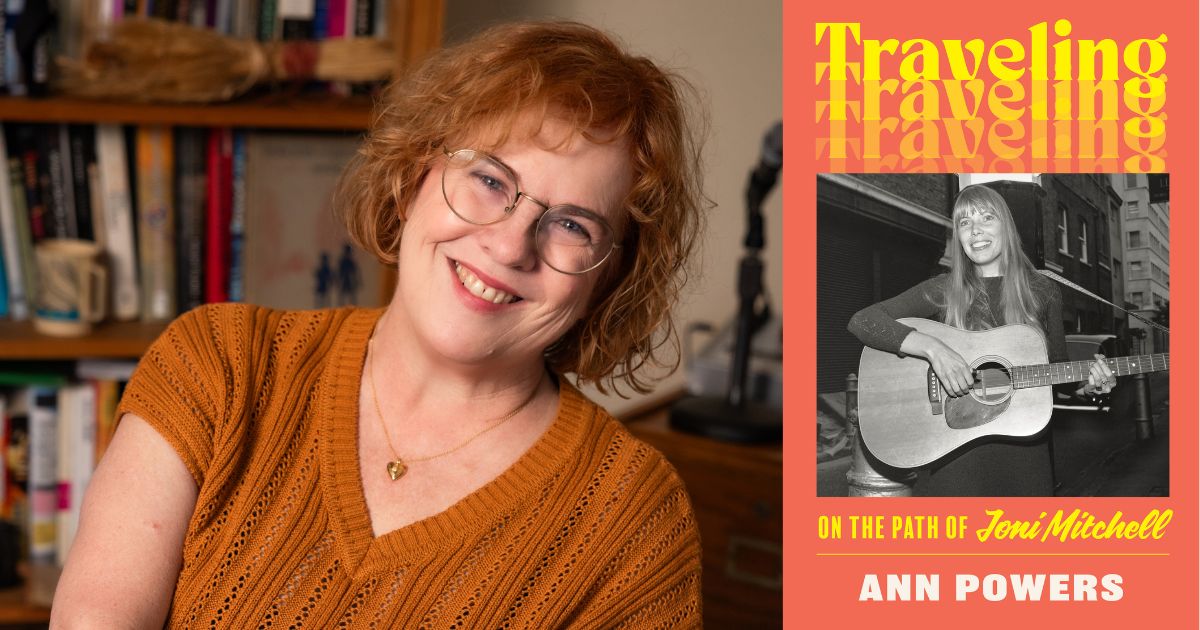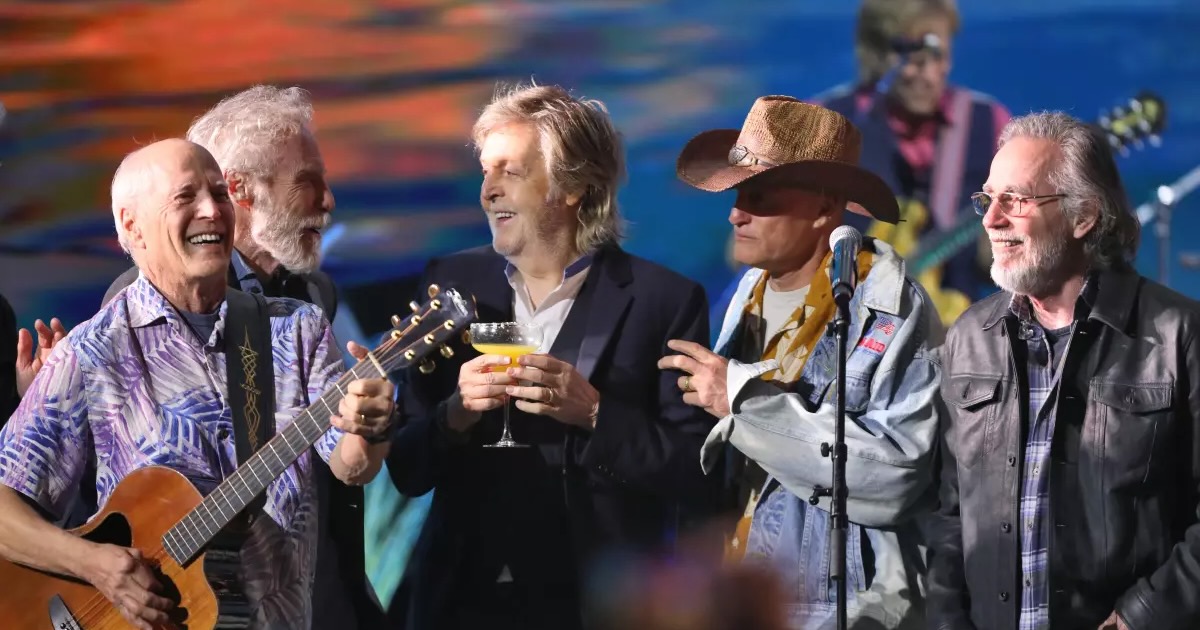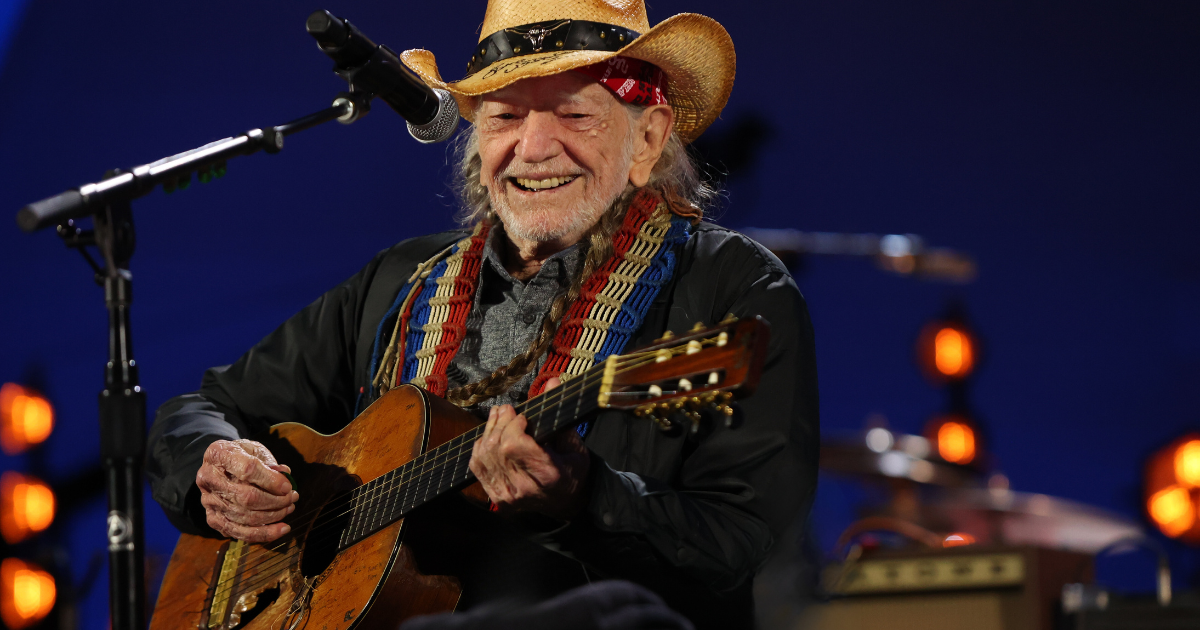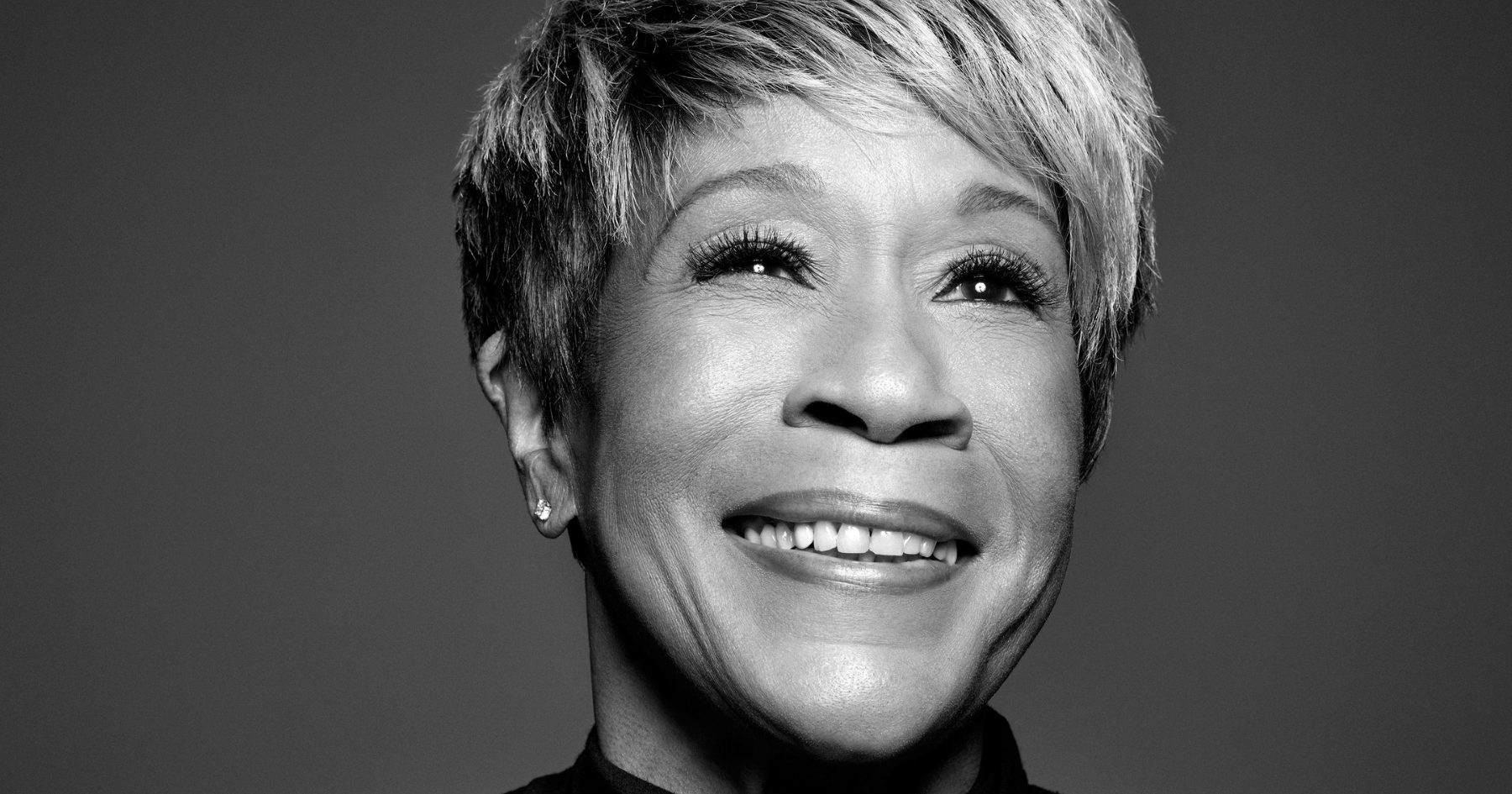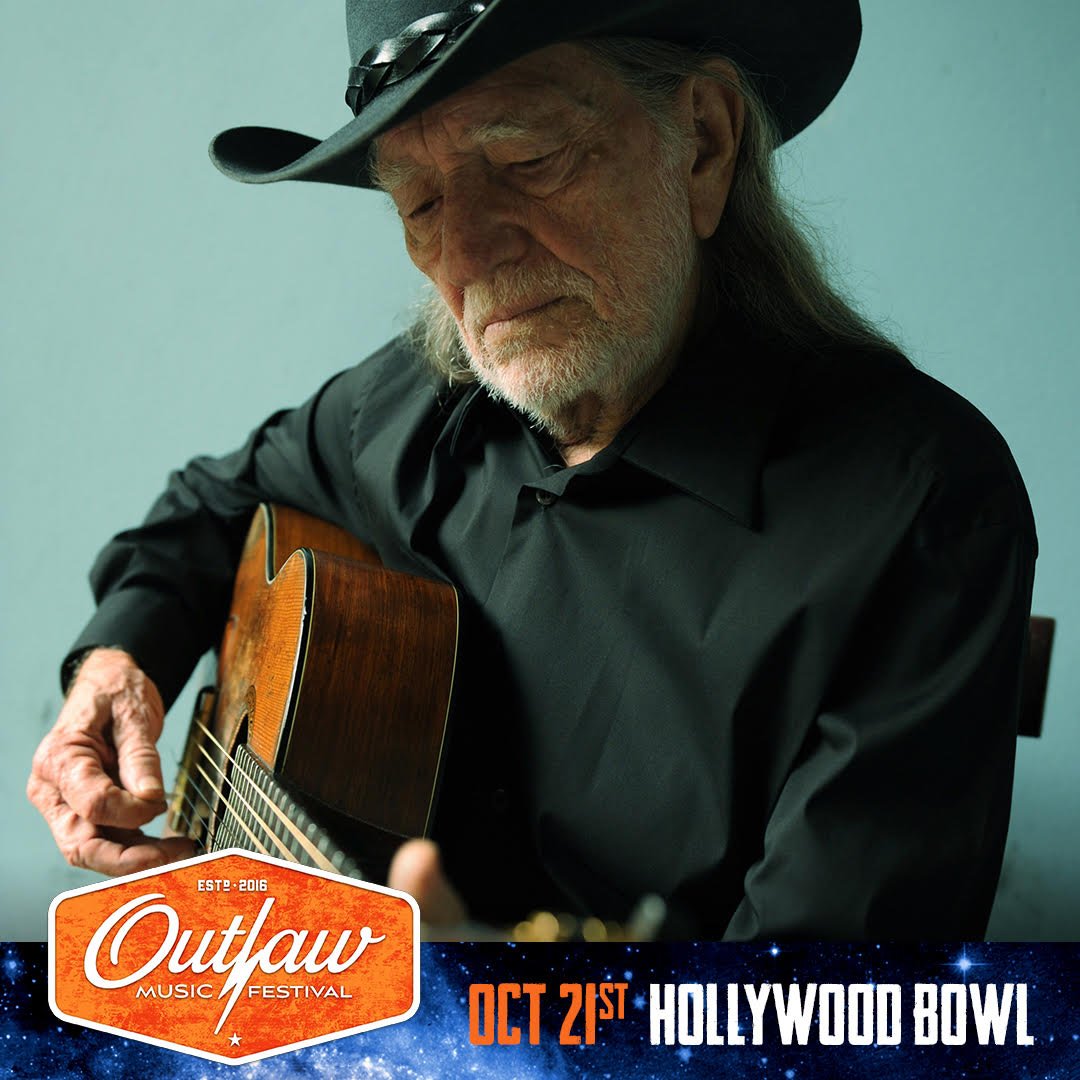Tag: Hollywood Bowl
PHOTOS: Rhiannon Giddens’ American Tunes at the Hollywood Bowl
Earlier this week, on Wednesday, June 18, GRAMMY winner and MacArthur “Genius” Rhiannon Giddens brought American Tunes – a star-studded edition of her Old-Time Revue – to the Hollywood Bowl in Los Angeles, California. The evening featured a vast array of American roots music spanning eras and genres, from old-time and cajun to bluegrass and blues, Americana and folk, all brilliantly interconnected by Giddens’ masterful curation.
Taking the stage in front of the 18,000 capacity venue, Rhiannon welcomed the audience to her front porch – probably the biggest front porch ever – before kicking off the evening with Dirk Powell, her powerful vocals echoing the Bowl. After welcoming the audience, BGS’ own Ed Helms has on hand to introduce Our Native Daughters, Giddens’ female quartet supergroup featuring Amythyst Kiah, Allison Russell, and Leyla McCalla (instrumental backing by Russell’s Rainbow Coalition band filled out the songs, making them feel lush and all the more powerful).
After a brief intermission, it was time for another roots supergroup: this time with Steve Martin and Alison Brown. Both were in fine form: Alison as expert as ever on the five string banjo, and Steve doing as close to a solo comedy set as we’ve seen in years. It was a portion of the show who’s only fault was that it felt much too short. But there was still plenty of music to come…
Helms returned to the stage with Rhiannon for an a capella duet before picking up the banjo and joining her Old-Time Revue. Finally, we were back on that massive front porch. For the final portion of the evening, Rhiannon, Dirk, and the rest of the band (Dirk Powell, Amelia Powell, Jason Sypher, Demeanor) made a very large group of strangers feel like we were home. And in the immortal words of Paul Simon with which Giddens closed the show “We [came] in the age’s most uncertain hours // To sing an American Tune.”
Below, enjoy our BGS exclusive photos from American Tunes.

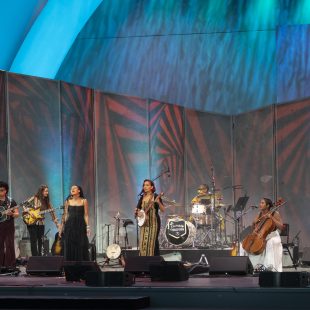
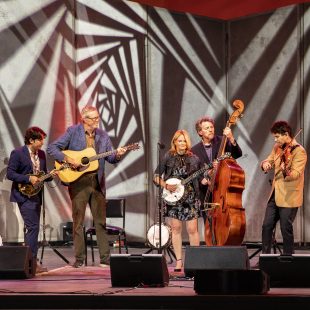
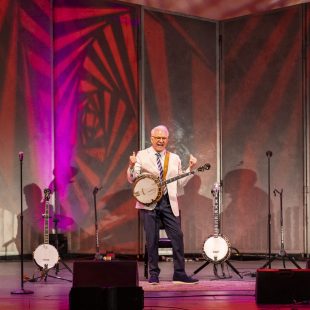
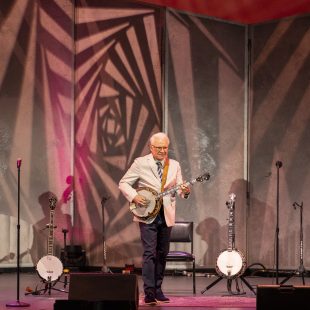
All Photos: Elli Lauren Photography
Enter to Win Tickets to Rhiannon Giddens: American Tunes feat. Steve Martin, Ed Helms, Our Native Daughters, and more @ Hollywood Bowl (Los Angeles) on 6/18
Writer Ann Powers Discusses Her Acclaimed Joni Mitchell Book, ‘Traveling’
Journalist, author, and cultural critic Ann Powers released her latest book, Traveling: On the Path of Joni Mitchell, in June of this year. A thought leader in pop and pop culture criticism – and an occasional BGS contributor – Powers considers this legendary figure in folk and American music with deliberation and intention. Traveling isn’t merely a biography or a retelling of well-known and oft-repeated Mitchell lore; instead it’s a careful consideration of the artifice and sincerity, publicity and privacy, myth-making and universe-building of this iconic musician, songwriter, and celebrity.
“I wanted to think about how Joni Mitchell became JONI MITCHELL,” Powers relays in her conversation with BGS executive director Amy Reitnouer Jacobs. “How she fought against that in her own life, and how she reinforced the legend as well.”
And how well-timed is this book and conversation, with Mitchell’s mythos at perhaps its lifelong peak? With Brandi Carlile’s assist, Mitchell has been enjoying a “Joni-ssance” of late, with jaw-dropping public appearances over the past couple of years after an extended hiatus and star-studded Joni Jams delighting fans and acolytes from the Gorge in Washington state to Newport Folk Festival in Rhode Island.
Fresh off Mitchell’s headline-grabbing appearances at the Hollywood Bowl on October 19 and 20, we’re sharing our recent conversation with Powers about Traveling, its inception and writing, and how a truer telling of Mitchell’s life and creative journey requires a degree of skepticism – and may just result in becoming an even deeper fan of the one-and-only Joni Mitchell.
Right off the bat, I really connected with your hesitation to write this book, because I find that I have a complicated relationship and love of Joni, and I’ve never been able to put it into words. So when you start your introduction with that exact sentiment, I felt that really deeply. What was your thought process in committing to the book?
Ann Powers: Well, Amy, you understand more than most the thorny relationship we as writers and as lovers and supporters of music have with not artists in particular, but kind of the edifice around the art, or as Joni herself says, “The star-making machinery.” I’m very aware of how artists exist in one space and then there’s like a room where the artist lives, and in between is this space where a lot of misconceptions can happen. A lot of fetishization can happen. I was kind of trying to walk between those rooms and think about her as a public figure, as a legend.
And then, also what I could know of her from a distance. I say from a distance, because I did not interview her for this book – which is not unusual for biographies, by the way – but I foreground that because I wanted to say, “Look, I’m also a stand-in for maybe not the average Joni fan, but for those of us who are kind of considering these people that we’ve made immortal through our love and adulation.”
I wanted to think about how Joni Mitchell became JONI MITCHELL, how she fought against that in her own life, and how she reinforced the legend as well. That was the strong thread for me and an attraction to the project. My hesitancy was that I wasn’t going to be able to overcome the legend.
You say multiple times in the book how you’re not a biographer, but despite the chronological order, the book felt almost like a guide to being a critical fan. How have you developed as a fan in this writing process? Are you still a fan?
I’m definitely more of a fan than I ever was before. I would count myself among those people who took Joni Mitchell for granted before I was approached to do this book. And part of it, I think, is my self-styled “outsider” status. That’s a weird thing to say, but [I say it] as a misfit or someone who came from punk. When I was at the right age to have my “Joni phase,” my idols were Kate Bush, Debbie Harry, Chrissie Hynde, women who I now realize were deeply influenced by Joni themselves, but at the time who seemed almost like an alternative to her and Dylan and Neil Young.
The ’90s [were] the natural time for me to go through another Joni phase and then I did. I did get to see her at that amazing show at the Fez [in 1995] with Brian Blade. I had some prime Joni moments and definitely was listening more than I had in the past, but that was sort of like that moment when Tori Amos, Sarah McLachlan, PJ Harvey, and so many amazing artists were breaking through the Lilith Fair generation.
And here’s Joni in the press, bad-mouthing them or saying, “I don’t want to have anything to do with them.” So again, I’m like, “Oh, who is this person? Why is this person so hostile?” It’s like all these moments that would have been the one where I stepped onto that path turned me away from it – until much later, when I had an occasion, this book, to go beyond the surface of my fandom. Then I just went completely, fully in. So deep. And every step I took that was closer to her actual music and her actual words, not just her song lyrics, but interviews she’s given or the circumstances of her life, I became more and more of a fan.
In that way, this book is the story of me becoming that defender in the end, even if I’m still a skeptical defender, but I believe that that is something Joni teaches us to be – to yourself and as a skeptical defender of those people she admires.
The funny thing about Joni is that she took every step she could to stay off of that pedestal throughout her career. Sometimes I think her desire to not be encased in amber came from her own anxieties, like her own unhappiness with what fame wrought. It’s a very delicate thing.
This is such an important part of her music and her songs as well, especially an album like The Hissing of Summer Lawns, which is basically a critique of Hollywood. She’s living in Bel Air. She’s hanging out with Jack Nicholson and Warren Beatty and the glitterati. She is of the glitterati. But then she’s also the one who runs away, who goes, “I’m living a monk-like existence outside Vancouver for a while.” Or, “I’m getting in my car by myself and driving across the South and using aliases and checking into hotels and hanging out with whoever’s in the lobby.”
This is something she kept doing in order to check herself and check the mechanisms around her and not become complacent with where she was. Same in terms of her collaborators. Instead of just doing what you’re advised to do in the music industry, which is just stick with the formula, she just kept blowing things up. She’s like, “I want to play with these jazz guys. I want to bring in like Brazilian percussionists.” That’s her curiosity, as I say in the book, but it’s also her refusal to be a conventional pop star. She’s always kind of trying to keep that at bay.
There’s something that you mentioned about the women you did look up to. When I think about Kate and Chrissie and Debbie, these women stand on their own; holding their own in a male-dominated scene and being surrounded by male collaborators and bands, but not necessarily lifting up other women. I’m trying to think of a female collaboration that Kate Bush ever did and I can’t think of one.
Well, when we look historically at the place of women, particularly in rock, there were labels attached to women who primarily collaborated with women – “women’s music,” right? That was lesbian music. And I think there was a lot of fear, and frankly, internalized homophobia, among a lot of women and people in general in the more mainstream music business.
So you didn’t want to be associated with too many women or people might think you don’t like men, you know? Read any interview with a woman star from 1967 to probably like 2020 and you’re going to see that phrase. “I love men,” you know, “I like male energy,” all this stuff. And there’s no shame in liking to work with male collaborators, but it’s amazing how fearful so many women and their teams – the people guiding their careers – were of female collaboration and female affinity. It was like a forbidden zone.
Of course, I also love the Go-Go’s and the Bangles, but girl groups were [their] own kind of zone. They were taking on these personae. These are great musicians, why did they have to dress up like ’50s pin-ups? It’s like they’re saying “Look, don’t worry! We’re real women! We can play instruments, but we can be girls too!” And despite what we think, that’s still so alive and well today. Though I do think there’s been a shift in the mainstream recently with artists like Chappell Roan and boygenius. There’s definitely younger millennials and Gen Z fighting against being confined by gender roles.
I have also noticed that younger artists are more eager to welcome their women heroes on stage and older women are more comfortable embracing it. Olivia Rodrigo is constantly pulling her heroes on stage. Katie Crutchfield from Waxahatchee is like, “Where is Lucinda Williams? Let’s bring her out.” And that was something you actually didn’t see even during the Lilith Fair years. It didn’t happen. You didn’t really see older artists on the lineup.
I loved the line in the book, “A map maker must be open to new routes.” Were there any new routes that surprised you, or unexpected people that came out of the woodwork?
Definitely the whole Florida thing. When I found out she had spent time down there and met Bobby Ingram – who’s since passed away. And, I didn’t really know there was this whole kind of mirror folk scene in Florida to that in New York.
But I also didn’t know about how diverse the early folk revival was. This is something [for which] I give a lot of credit to Dom Flemons. He’s been doing the work on this, but it’s still so under-explored. When Joni started out, she wasn’t just seeing Pete Seeger wannabes. She was also seeing Caribbean musicians and people doing musical theater and jazz rock or jazz folk, and although it was still a predominantly white scene, there were very important nonwhite artists on that scene.
In my early days [of writing], I just wanted to write a book about that. Uncovering the stories of other musicians who we forget when we only talk about Guthrie or Seeger or Dylan or whatever. It’s like, how white and boring can it get? If it’s just that, it’s that same story every time and yet it was so much deeper and richer and more interesting. And it’s so important to understanding Joni’s music, because her music was never pure folk.
Somewhere in the last seven and eight years of putting this book together, Brandi Carlile kickstarted the “Joni-ssance” as you put it. How did that change your process?
I thought Brandi would stop at her Blue concerts [at Carnegie Hall and Walt Disney Concert Hall in 2021], but suddenly it was like, “Oh wait, there’s so much more!” It’s been such an exciting story in and of itself that goes beyond music. It’s really the story of recovery, healing, and having this epic return. So on that level, it’s a like beautiful human story that’s been edifying to watch.
But I made the choice to stand apart [from the Joni Jam concerts] so I could continue to keep my perspective focused. Now with the book out, I can finally just enjoy this woman who gave us so much and is receiving her accolades. There’s a world of elders – and especially women elders – that I want to continually acknowledge. And if this project could be helpful in that, then I’ve done something positive for the world.
Photo Credit: Emily April Allen
BGS Bytes: Your Roots Music Social Media Round-Up
Welcome to the second edition of BGS Bytes! From up and coming artists on TikTok to conversations the biggest artists are having online, we’re here to round up any important things happening online in roots music — so you can save your thumbs a few scrolls!
In no particular order, let’s take a look back at a few notable highlights from bluegrass and country social circles in the last few weeks.
Spotify Stopped Paying Out to Small Artists On Its Platform
Spotify has now changed which tracks are eligible for monetization. Tracks with under 1,000 streams will earn nothing from the streaming giant.
— More Perfect Union (@MorePerfectUS) April 3, 2024
In early April, More Perfect Union reported that Spotify has stopped paying out for artists whose songs don’t top 1,000 streams. While this change won’t impact musicians who top the charts, it reduces profitability for smaller up-and-comers. Of course, this also impacts all genres, not just roots music, a genre that has already historically struggled with a digital era. We might have posted some satirical news about Spotify recently, but this is all too real.
I’m With Her Celebrates the Eclipse
View this post on Instagram
Could there possibly be new music on the way?? I’m With Her posted a reunion photo with all three members: Sara Watkins, Aoife O’Donovan, and Sarah Jarosz, as the golden trio took in the eclipse through solar viewing glasses!
Black Opry Hit Mainstream News Talking About Beyoncé’s New Album
Tanner Davenport, co-director of The Black Opry, spoke with MSNBC in March about the record-breaking album, ‘Cowboy Carter,’ that’s been setting tongues wagging since its debut.
“She has always been country”: Critic on Beyoncé’s “Cowboy Carter”
Tanner Davenport, co-director of The Black Opry, spoke with MSNBC’s @AlexWitt following the release of the music idol’s record-breaking new album. pic.twitter.com/BFubaNCig1
— MSNBC Reports (@MSNBC_reports) March 31, 2024
A Star-Studded Cast Paid Tribute to Jimmy Buffet
@amandapaulak the craziest video youll see today #jimmybuffett #maragaritaville #harrisonford #paulmccartney #juddapatow #woodyharrelson #theeagles #pitbull #brandiecarlile #sherylcrow #bonjovi #joewalsh ♬ original sound – Amanda
One of the wildest social media videos you’ll see this week features a surprising crew — watch Harrison Ford, Paul McCartney, Will Arnett, Brandi Carlile, Mac McAnally, Jon Bon Jovi, Vince Gill, and Pitbull on stage singing “Margaritvaille” together. That’s not an exhaustive list, of course, so let us know who else you can spot! It’s hard to count all the celebs in this Jimmy Buffet tribute.
Orville Peck Celebrated His New Release With Willie Nelson
If you missed it, Orville Peck recently released a recording and accompanying music video for “Cowboys Are Frequently Secretly Fond of Each Other” with Willie Nelson. The video has already racked up more than half a million views on YouTube! Turns out there must be many a cowboy feeling the vibes Peck and Nelson are putting out.
Viewers Have Been Digging Tyler Childers’ Live Performances on TikTok
@itscristal.g Most amazing concert 💓#tylerchilders #tylerchildersconcert #mulepulltour #country #countrymusic #concerts ♬ original sound – ⚡️Cristal⚡️
A handful of Tyler Childers’ videos have gone viral in the last few weeks, including the above that’s racked up more than 179,000 likes and nearly two million views. Hey, we can’t blame y’all for loving his music, especially when it’s performed live!
Gary the Snail Sang “Fast Car”
@ai.concerts This version should’ve been performed at the Grammys.. Gary the Snail sings Fast Car by Tracy Chapman #fyp #aicover #spongebob #tracychapman #gary ♬ Gary the Snail Fast Car – AI Concerts
With nearly three million views, Gary the Snail’s version of Tracy Chapman’s “Fast Car” has been taking over TikTok. Just a silly little cover, you’re sure to get a good chuckle, even if you’re not a huge SpongeBob fan.
It’s pretty obvious — a lot happened in March and the beginnings of April! We’ll continue rounding up the hottest social media conversations and goings-on for BGS readers every month — let us know on social media and tag us in a post if you think something deserves to make the next list.
Photo Credit: Jackson Browne, Paul McCartney, Woody Harrelson, and more perform on stage at the Jimmy Buffett tribute on April 11, 2024 shot by Randall Michelson / Live Nation – Hewitt Silva.
Minute-by-Minute at Willie Nelson’s 90th Birthday
6:35pm – Billy Strings kicks off Night Two at the Hollywood Bowl with “Whiskey River.” It’s the same song as the first night but it’s a welcome repeat number (and face).
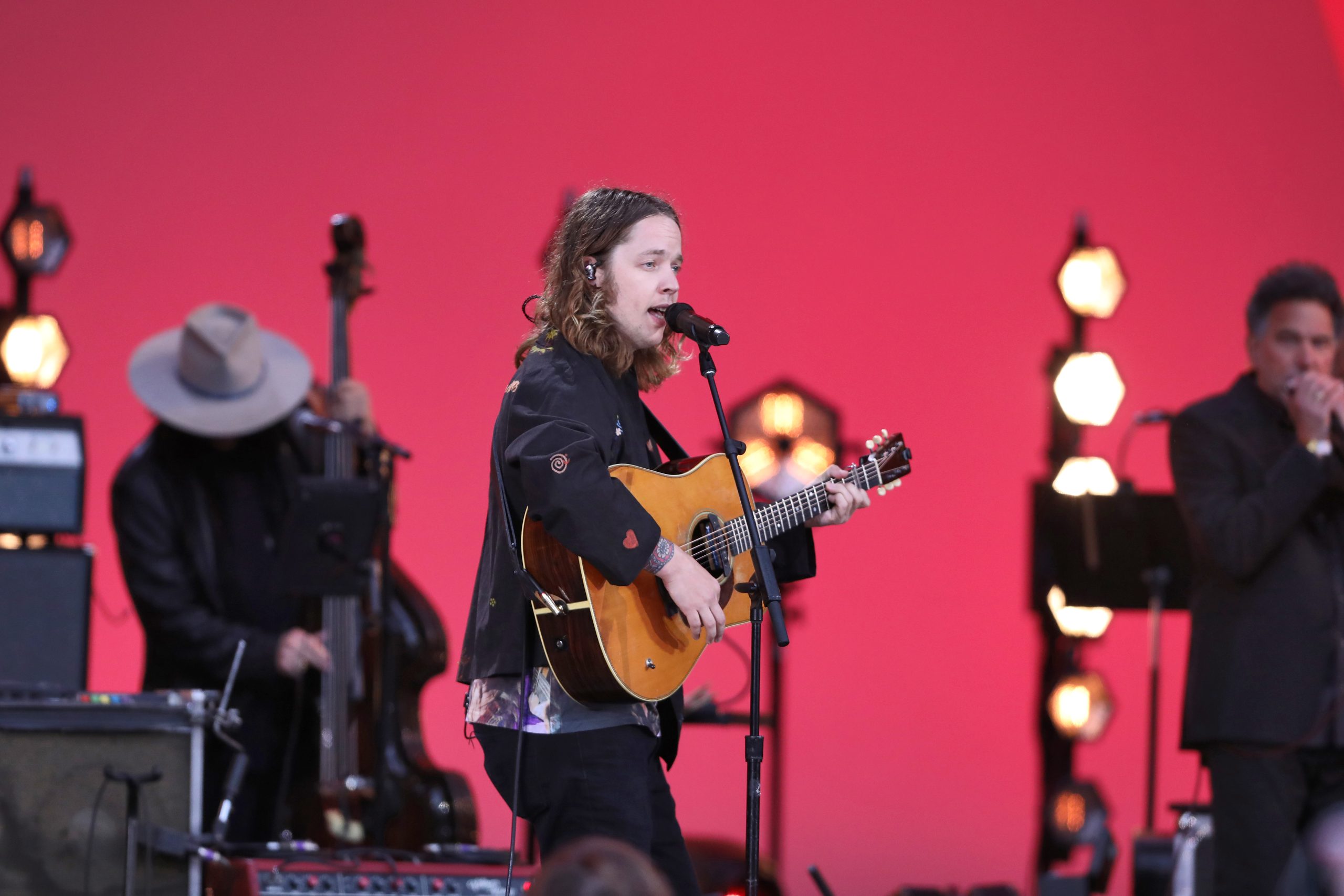
6:39pm – Ethan Hawke opens the show, saying “Willie has always stood for equality,” so it’s no surprise to see the next guest…
6:40pm – It’s Orville Peck in a sleeveless vest (Aren’t his arms cold?! It’s freezing tonight) and his classic fringed mask. Performs “Cowboys Are Frequently, Secretly Fond of Each Other.” Makes use of the full Hollywood Bowl stage – he is owning this moment.
6:45pm – Charley Crockett. “Yesterday’s Wine.” Lady in box next to me states loudly, “Now this is real country.”
6:49pm – Allison Russell and Norah Jones do “Seven Spanish Angels.” These two voices are so perfectly in sync… please call me as soon as they do a duet record together.
6:56pm – Chelsea Handler introduces Dwight Yoakam for “Me and Paul.”
7:05pm – Waylon Payne and Margo Price take the stage together for “Georgia On A Fast Train.” These two are having the absolute best time together. Their chemistry is off the charts. From the box next to me, I hear a fan whisper under their breath, “MARGO IS MOTHER.” Couldn’t agree more.
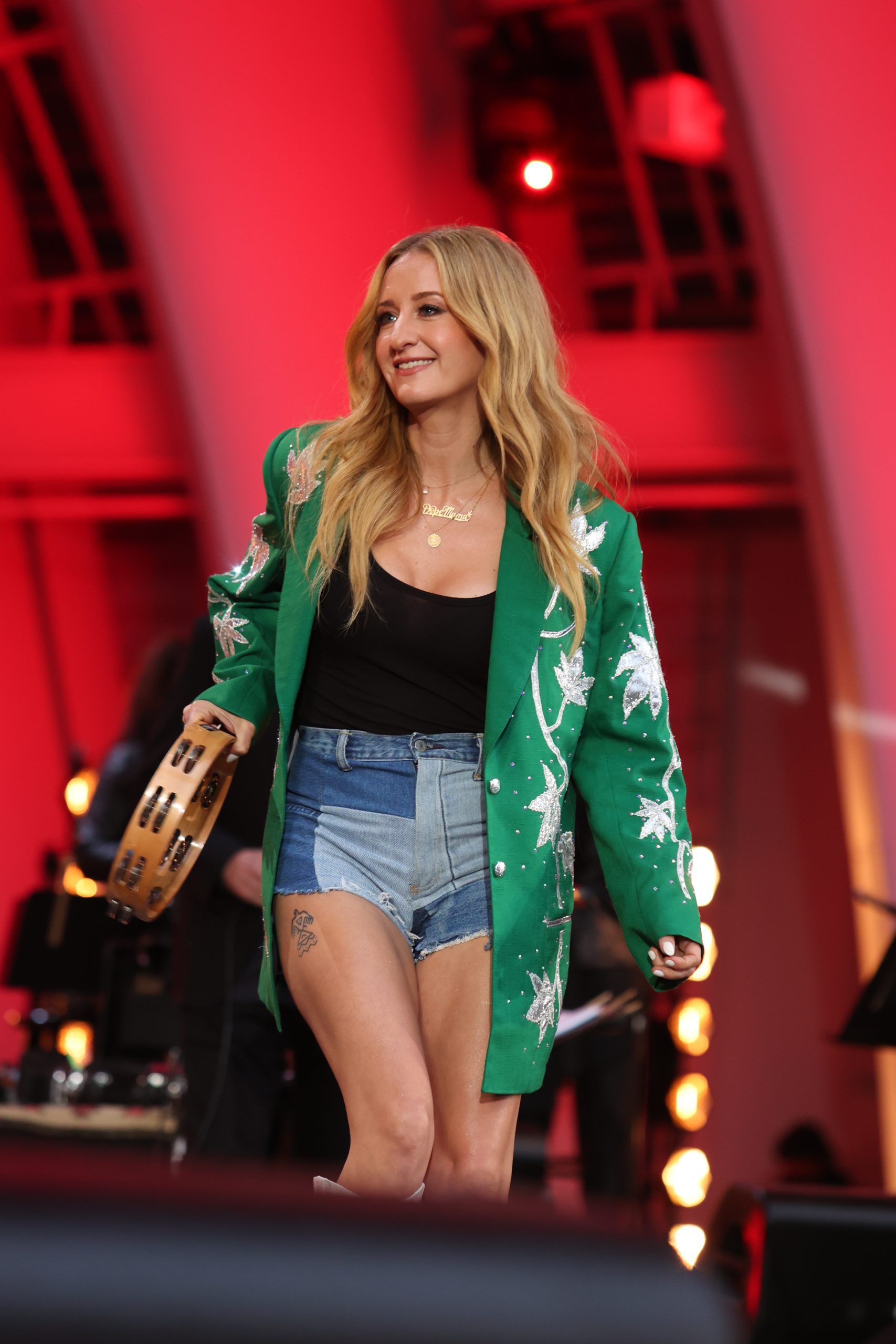
7:14pm – Particle Kid (aka Willie’s younger son, Micah) along with Daniel Lanois. “I went to the garage and got high as shit and wrote a Willie Nelson song.” The lyrics come from a phrase his dad said one day: “If I die when I’m high I’ll be halfway to heaven, or I might have a long way to fall.”
7:19pm – Dame Helen Mirren (!) introduces Rodney Crowell. Emmylou joins mid-song for “‘Till I Gain Control Again.” Crowd goes bananas.
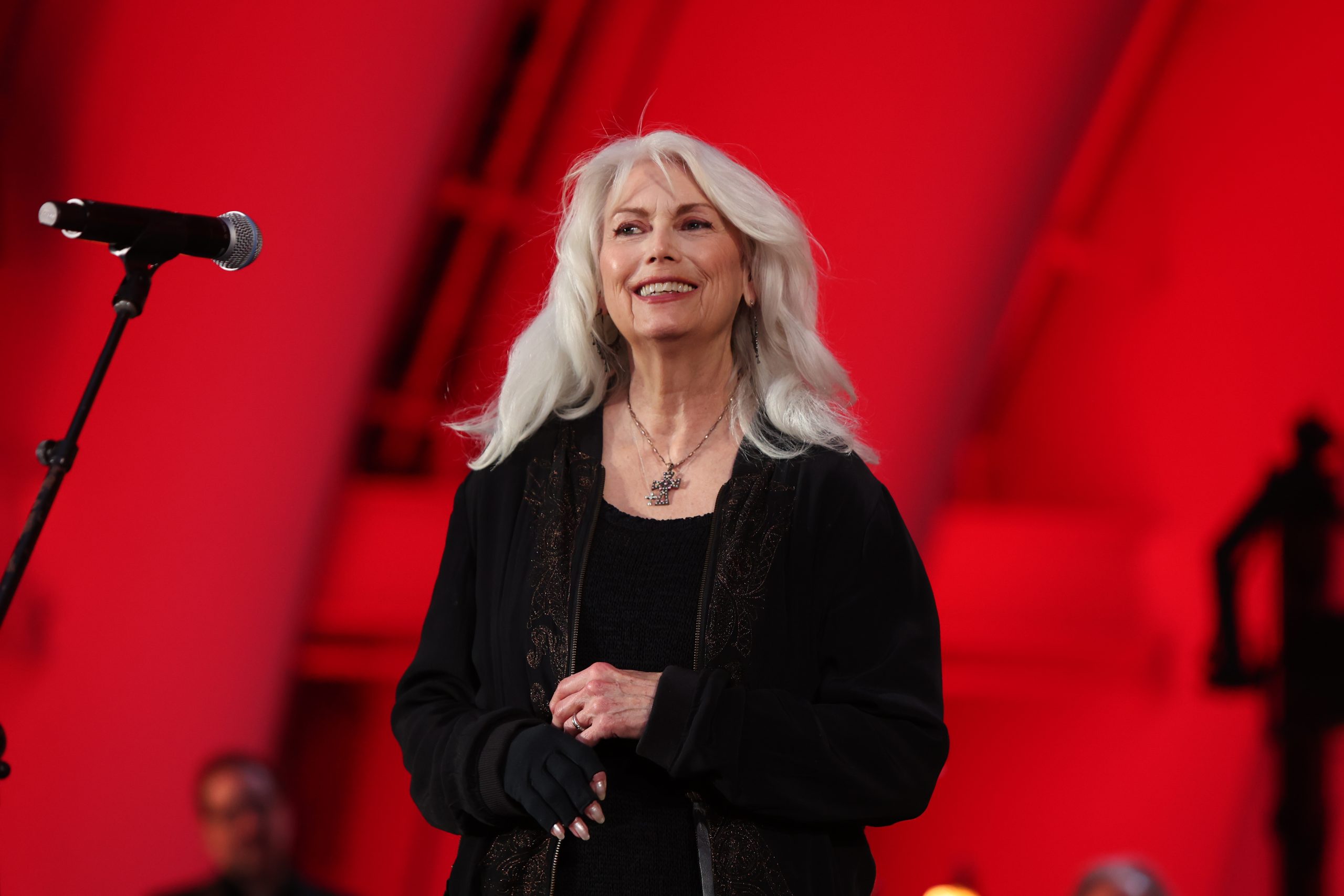
7:33pm – Rosanne Cash does “Pancho and Lefty.” Totally different interpretation compared to Night One (where it was performed by Willie and George Strait), but a universally beautiful song nonetheless.
7:46pm – Lyle Lovett melting hearts and brains on “My Heroes Have Always Been Cowboys”
7:53pm – The “Aloha State Statesman” Jack Johnson performs one of the only non-Willie catalogue songs of the night, “Willie Got Me Stoned and Took All My Money.” He wrote it after Willie got him stoned and took all his money (in a poker game).
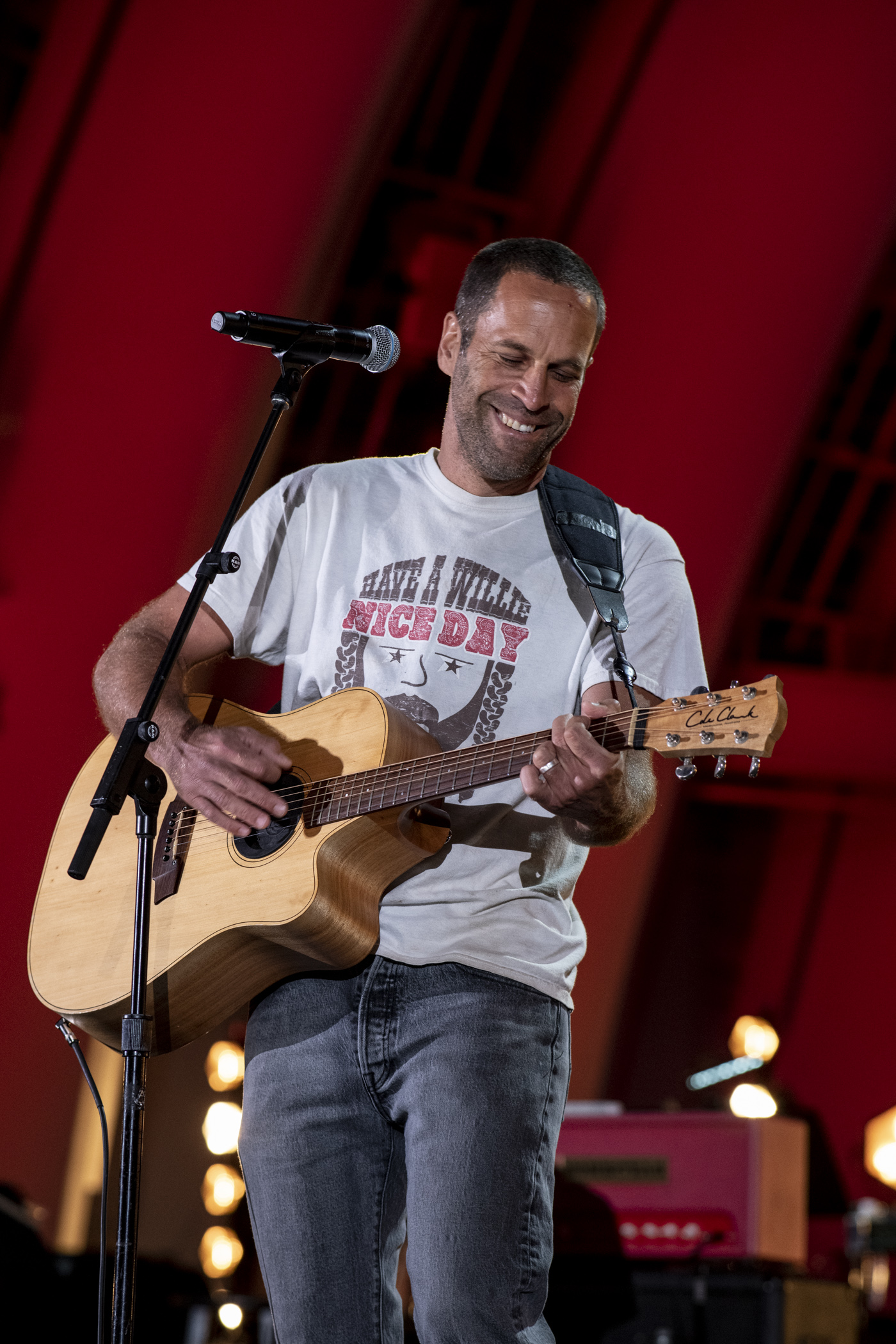
7:57pm – Beck (in sunglasses). First artist to acknowledge the unreal house band. “Can you imagine waking up in the morning and opening your eyes and realizing ‘I’m Willie Nelson’? It’s already a great day.” Performs “Blue Eyes Crying In The Rain.”
8:03pm – TOM JONES! One of the most unexpected joys of the night. His love for Willie shines through in his performance of “Across the Borderline.”
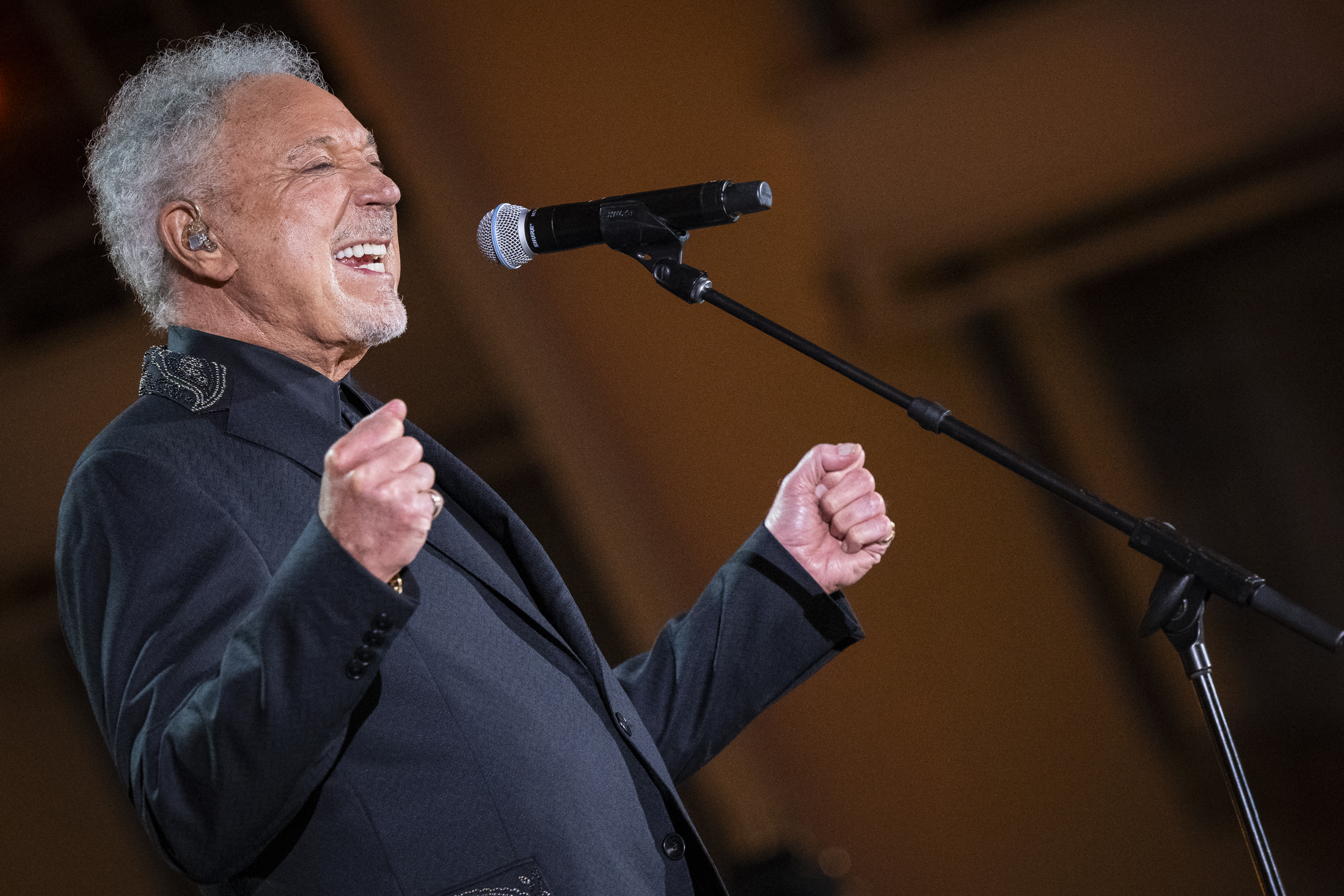
8:12pm – Surprise guest host Woody Harrelson takes the stage. “Not to self-promote, but just so you guys know, I did open a dispensary… seems like the right audience.” He introduces the legendary Bob Weir. Billy Strings and Margo Price join Bob on stage for a fun and enthusiastic “Stay All Night (Stay a Little Longer).” Margo is having the most fun tonight.
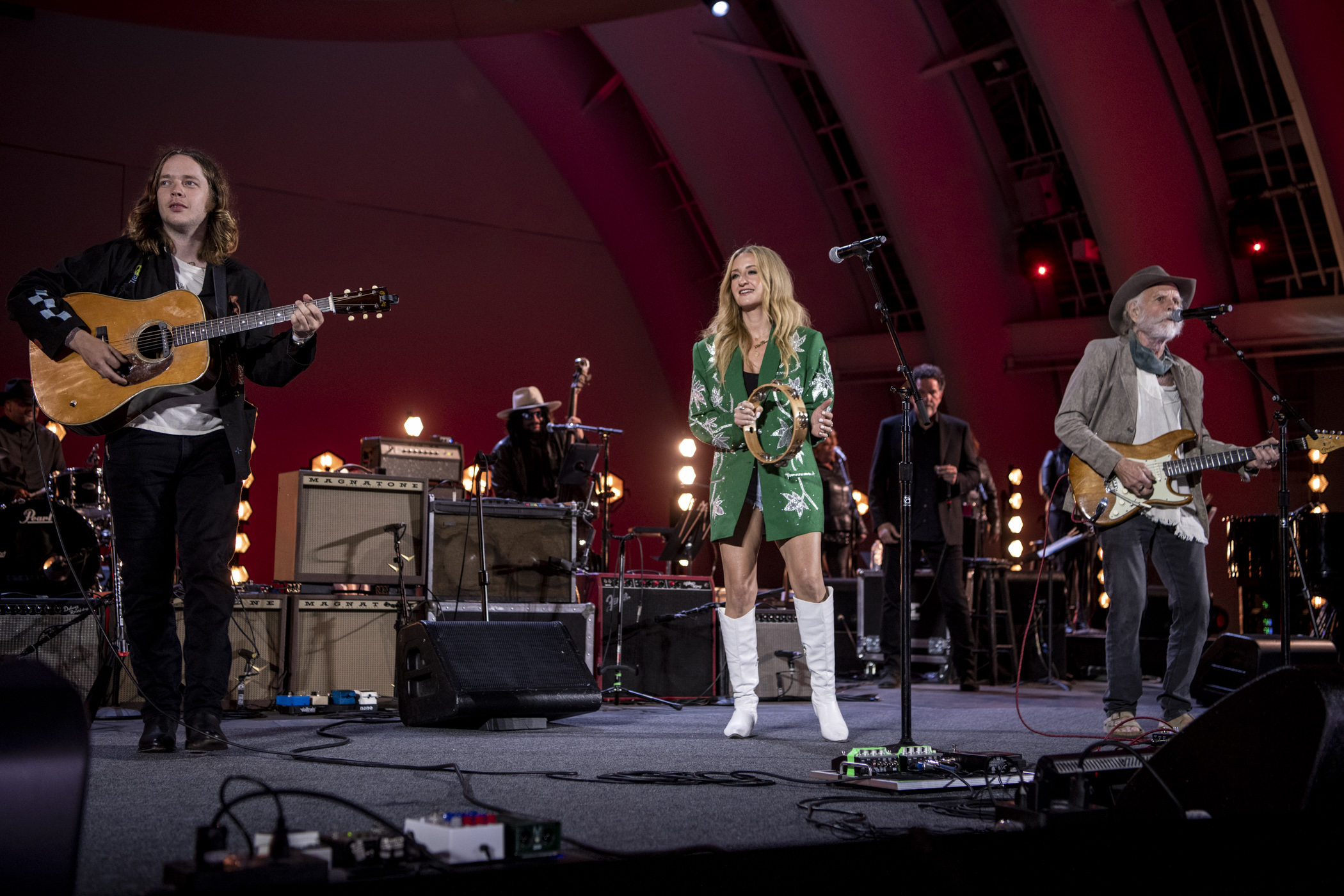
8:18pm – Shooter Jennings and Lukas Nelson together! The next generation doing their fathers proud with own rendition of “Good Hearted Woman.”
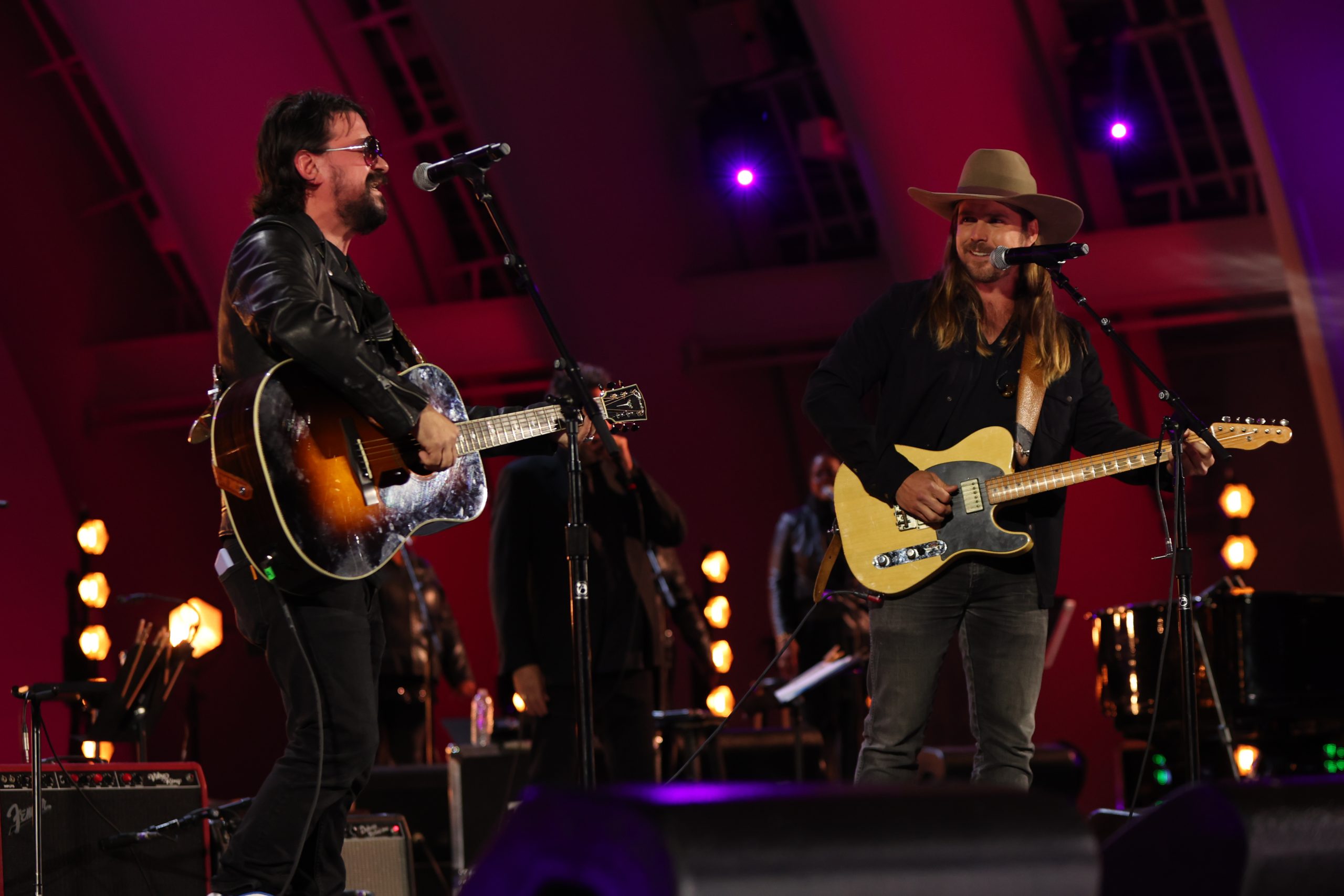
8:22pm – Lukas performs a heart-wrenching version of “Angel Flying Too Close to the Ground.” Sounds so much like his dad yet simultaneously unique to himself. He has all 18,000 attendees in the palm of his hand.
8:29pm – The Avett Brothers. Wow. They sound so good, and fresh off the MerleFest stage just 48 hours prior. It’s been a few years since I saw them and gosh I missed them.
8:40pm – Chelsea Handler introduces Norah Jones, who performs an instrumental ode to Bobbie Nelson.
8:43pm – Norah brings on Kris Kristofferson (!) and helps him through “Help Me Make It Through the Night.” There’s not a dry eye in the house.
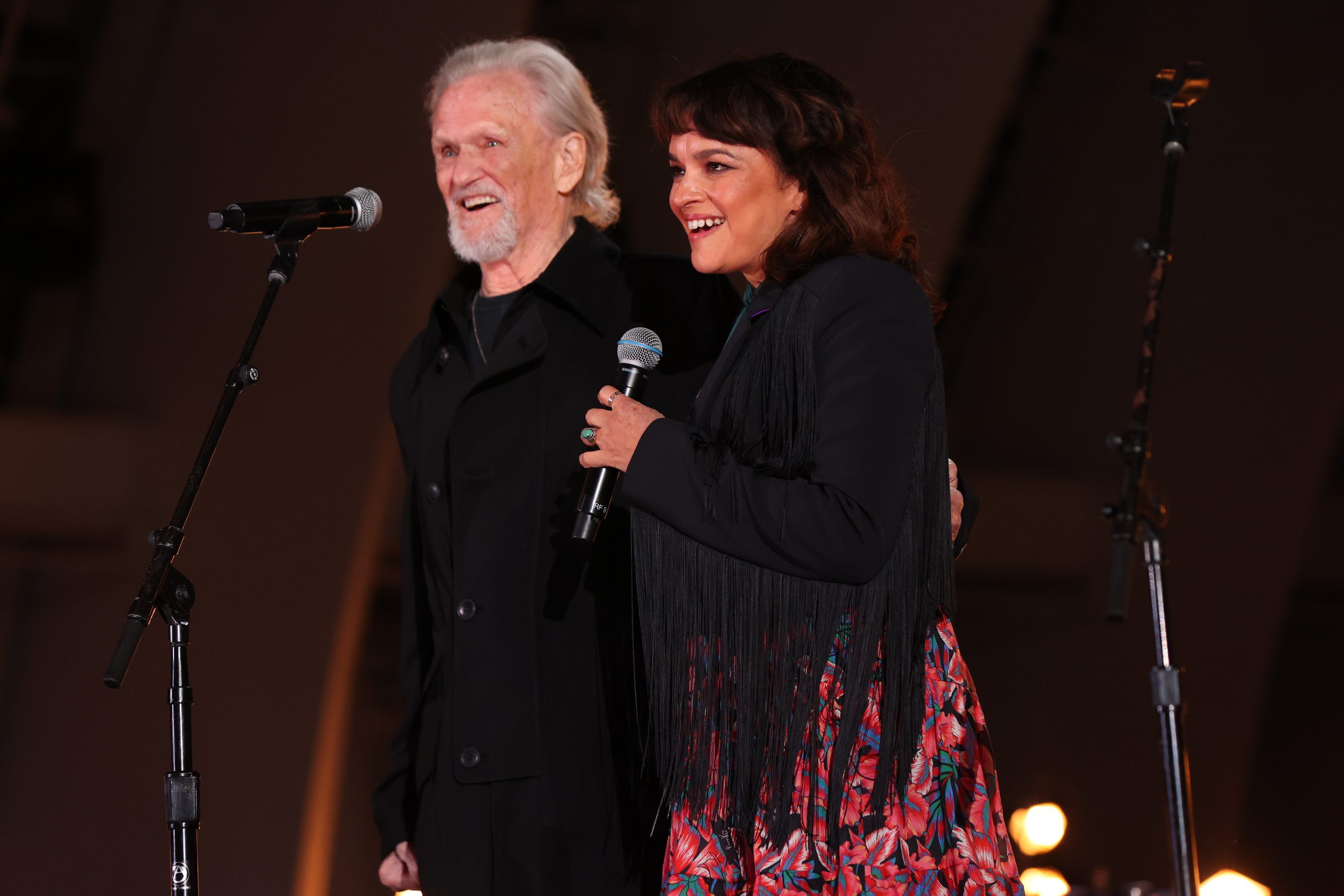
8:49pm – Ethan Hawke introduces Nathaniel Rateliff. Not unlike the first evening (where he performed “City of New Orleans”) he steals the show with “A Song For You.” Rateliff is a national treasure who should be protected at all costs.
8:54pm – Sheryl Crow does “Crazy.” Crowd (rightfully) goes Crazy.
9:02pm – Dave Matthews, overflowing with sheepish charisma, tells an amazing story about getting high with Willie on his bus and how proud his mom was of that moment. The photo of that night is still prominently displayed on her mantle. He performs “Funny How Time Slips Away,” a song that seems to be the theme of the night.
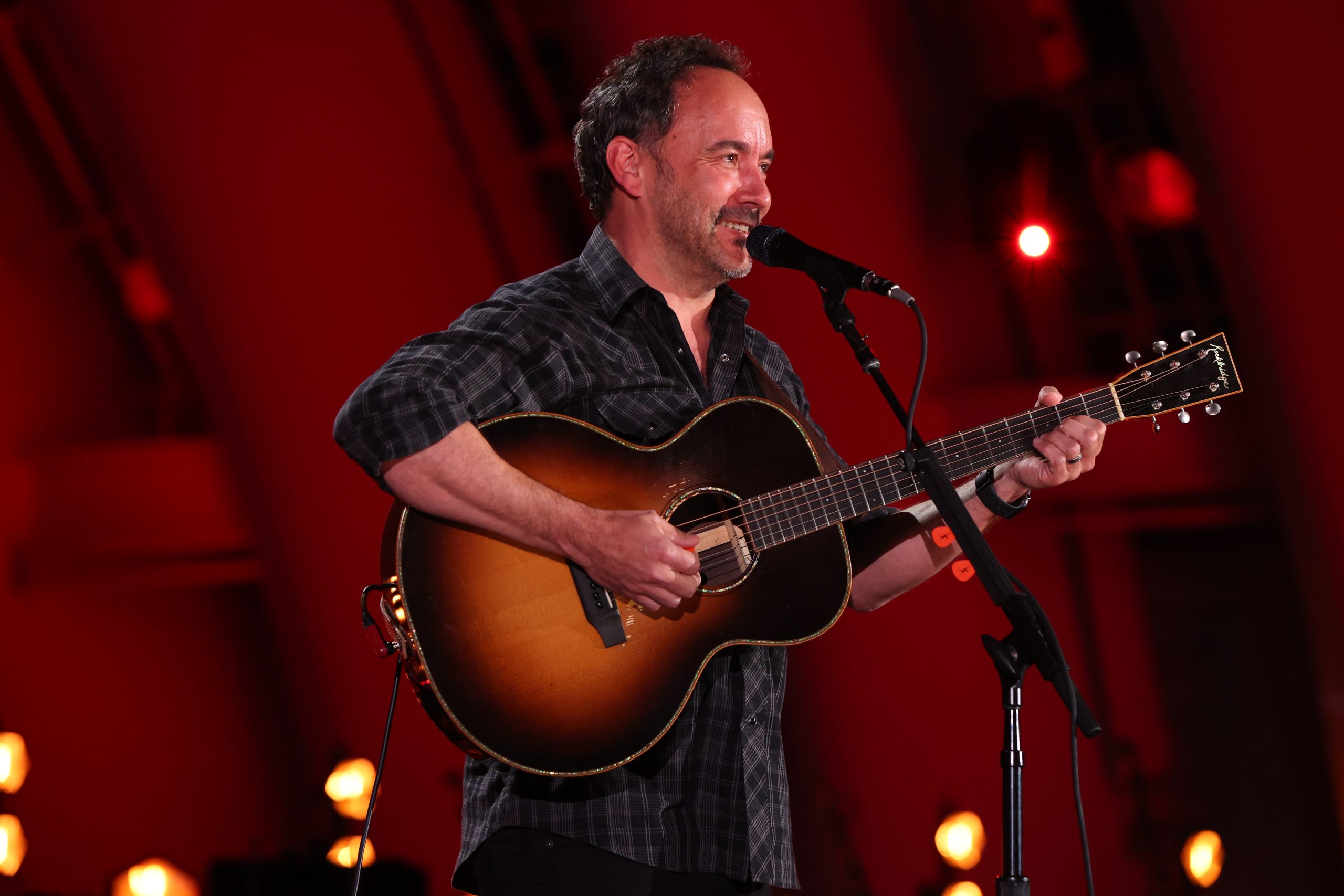
9:18pm – Jamey Johnson and Warren Haynes perform “Georgia On My Mind.” From the first word Jamey sings, the audience goes wild. These two bring down the house.
9:28pm – The Children of the Highwaymen, including Lukas and Micah Nelson (Particle Kid), Shooter Jennings, and Rosanne Cash. One of the few moments during the show with technical difficulties.
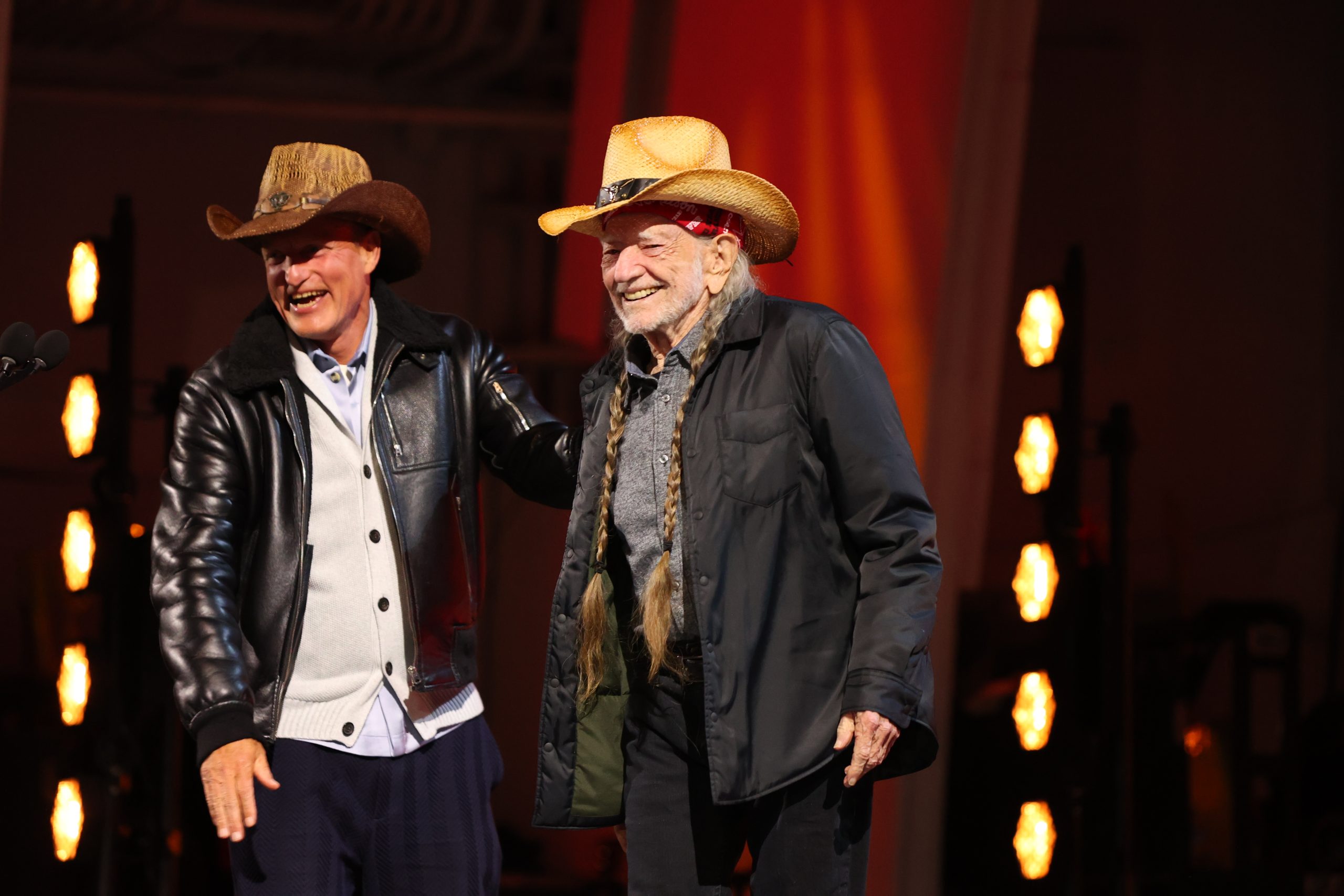
9:35pm – Woody Harrelson returns to the stage to introduce Willie. The man of the hour finally takes the stage. Willie performs “Stardust.” It is perfect. I am crying.
9:53pm – Willie duets with his longtime studio producer, Buddy Cannon, on “Something You Get Through” (which the two wrote together).
10:02pm – KEITH RICHARDS JUST WALKED OUT. I AM DECEASED. It’s hard to even remember what they performed because everyone is in such shock. (They performed “We Had It All” and “Live Forever”).
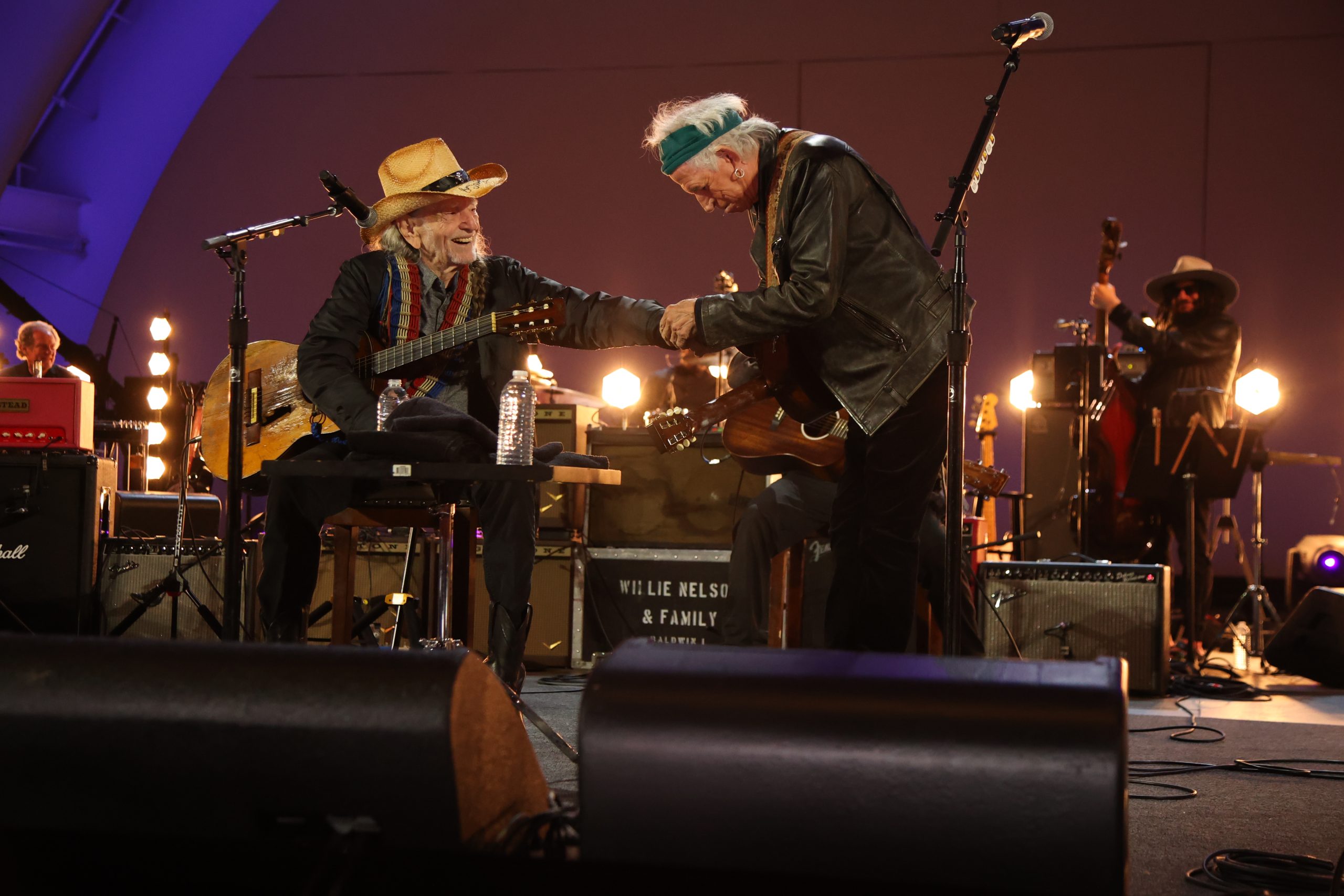
10:10pm – All skate. “On the Road Again” of course. Willie wraps up the night by taking us all to church, ending with a medley of “Will the Circle Be Unbroken” and “I’ll Fly Away.” It’s going to take an awfully long time to process everything from this weekend.
Lead photo of Willie Nelson by Randall Michelson.
The Show on the Road – Bettye LaVette
This week on The Show On The Road, we feature an intimate conversation with beloved soul and R&B singer, Bettye LaVette.
LISTEN: APPLE PODCASTS • SPOTIFY • STITCHER
Covering her remarkable six decades in show-business, we dive deep into LaVette‘s beginnings as a Detroit hit-making teenager during Motown’s heyday (her neighbor was Smokey Robinson), to her early career touring with Otis Redding and James Brown, and the hard times that followed, as a music industry steeped in racist and sexist traditions largely turned its back on her.
While other soulful song stylists like Sharon Jones, Tina Turner, Mavis Staples and others saw their status and popularity rise with time, LaVette remains an underrated, best kept secret on the Americana circuit, with younger listeners just discovering her remarkable work covering anyone and everyone from The Beatles to Neil Young to Billie Holiday.
After nearly dropping out of music, her remarkable comeback began in 2005 with a string of acclaimed records — bringing her from half-filled bars to singing “Blackbird” at The Hollywood Bowl with a 32-piece orchestra, being nominated for five Grammy awards, and being inducted into the Blues Hall of Fame.
One thing you’ll notice immediately is her fiery laugh, which punctuates the episode — even when telling the darkest stories, like her early manager getting shot and her 1960s hits being recorded by white artists, leaving her versions largely forgotten. Her Grammy-nominated newest LP Blackbirds, produced by legendary drummer Steve Jordan, shows her at her most vulnerable best.
Photo credit: Mark Seliger
